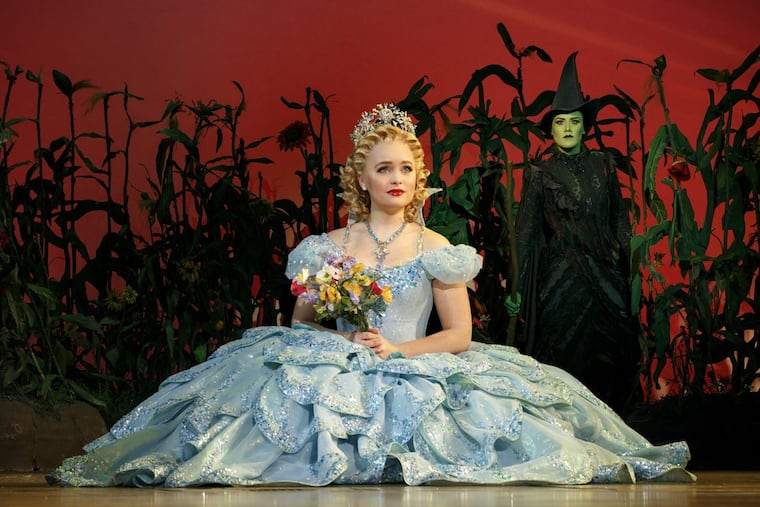We’re all stars, performing our lives | Francesca Serritella
A teenager’s world is so small, success feels zero-sum. If she gets the part, I don’t. If he likes her, I’ll have no one. If that college accepts him, they won’t take another. In a small pond, every ripple rocks your boat.

I recently saw my old friend perform as Glinda in Wicked on Broadway.
It was the first time I’d been out in months. I’d been holed up finishing a yearlong revision of my first novel. When I typed “The end” on a Friday in December, it felt like declaring victory.
I’d been meaning to see Amanda perform since she landed the role more than a year ago. Now she had only three performances left.
We’d first seen Wicked together 15 years earlier on a drama guild field trip. We all loved it, and I remember being struck by its focus on female friendship and ambition.
Amanda and I were theater buddies, sharing that compartmentalized intimacy that feels so deep backstage but that doesn’t necessarily translate to the lunch table. I was also, probably, certainly jealous. The spring musical was the biggest deal to me then. I was a dependable mezzo-soprano, always just missing the lead and landing understudy, paying dues for senior year. Amanda was a year younger, an alto with charm to spare, talented enough to buck the seniority. I remember being relieved that we were different voice parts.
A teenager’s world is so small that success feels zero-sum. If she gets the part, I don’t. If he likes her, I’ll have no one. If that college accepts him, it won’t take another. In a small pond, every ripple rocks your boat.
Then you grow up, move to a big city, and it’s an ocean of opportunities and disappointments; no one cares to covet your spot or pity your failures. The world is freeing in its vastness, but to be free isn’t unlike being unmoored. Your dream is a drop in a bucket, so a familiar face on the subway can feel like a lifesaver.
Even if that face is looking back from a promotion on a Broadway theater. I perked up whenever I saw Amanda on a Wicked poster or TV advertisement. I followed her career online, sharing excitement over her success.
Gone was the “her or me” of high school.
Here was something good happening to “one of us.”
There was another one of “us,” our theater crew, who I thought would appreciate seeing Amanda. Briana and I had stayed friends, but we didn’t get our acts together as frequently as we’d like. Briana travels for her career as an opera singer, and I’m often too firmly planted at my desk.
I took a shot and texted her about catching one of Amanda’s last shows. We got tickets for that very night.
That evening at the theater, we caught up before the curtain.
“Amanda invited us backstage afterward,” Bri said.
“That’s so nice of her.” I’d been too shy to reach out; now I wished I’d brought flowers. “You’ve kept in good touch with her since school?”
“Not really, mostly Facebook.”
Then Bri asked about my novel.
I confessed it had taken much longer than I thought, how my impostor syndrome never disappears, only mutates, how guilty I feel complaining about my dream job, and how afraid I am to blow it. I confided that I felt weirdly good about this revision, my inner saboteur eerily quiet, making me happy and scared.
Briana met my TMI with grace, and we bonded over our shared struggle and the mental and emotional stamina it takes to follow a dream.
The lights dimmed, and we turned our attention to the stage of another friend’s hard-fought dream come true.
From the opening scene when Amanda descended in her bubble, I was delighted. She was as I remembered, beautiful, funny, and winning on stage, but now her voice filled the Gershwin Theatre, as agile in the soprano range as it was rich in the alto, her talent in full bloom.
I wasn’t jealous or intimidated. I was thrilled.
We clapped our hearts out at the final curtain, along with the rest of the audience.
Backstage, we greeted Amanda with big hugs, real ones, like no time and a lifetime had passed. I felt all the warmth of our show family from 15 years before, but I was also starstruck by the professional she’d become.
After Bri and my gushing, we three traded the headlines of our lives, marveling at one another’s accomplishments — the same ones we personally dismiss.
It’s easy to dwell on what you’re not, or still not, but old friends can appreciate all you’ve become.
In the real world, there are no leads and understudies, there’s no one big show. We’re all stars, performing our lives seven days a week. It’s grueling, satisfying, exciting, and terrifying. We do much of it alone, but we didn’t get here by ourselves. What a pleasure it was to find these old lines of connection needed only to be dusted off. The petty jealousies had faded, but the support remained.
Three girlhood friends, now women, with our hands clasped like the three Fates, forming a full-circle moment.
We promised to get together again, for Briana’s next opera, or my next signing. I hope we do. But no matter what, I’ll always be rooting for them.
Because we came from the same place, and I can’t wait to see the places we’ll go.
Look for Lisa and Francesca’s new humor collection, “I See Life Through Rosé-Colored Glasses,” and Lisa’s number-one best-selling domestic thriller, “After Anna,” and her new Rosato & DiNunzio novel, “Feared,” in stores now. francesca@francescaserritella.com